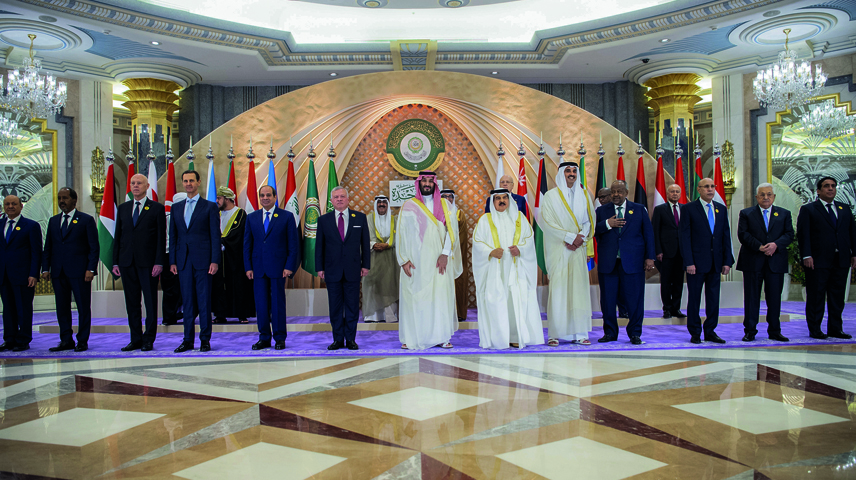The 32nd Summit of the League of Arab States convened in Saudi Arabia on May 19 with the World Order facing a “perfect storm” and the Middle East in the process of being “redefined”. Notably, I was glad to see Syria’s resumption of participation in Arab League meetings, despite opposition from some Arab countries. Additionally, the recent Saudi-Iranian agreement had a significant impact prior to the Summit.
The success or failure of the Summit depends on its ability to address three types of issues simultaneously: immediate crises, near and medium-term challenges that require action plans, and important longer-term strategic questions. This is particularly crucial during transformative times and before any attempts to redefine the Middle East.
Addressing Immediate Crises, Challenges, and Strategic Questions
Saudi Arabia's extensive pre-summit diplomacy deserves acknowledgement. Testimony to this was Bashar El Assad’s participation in the Summit, signaling Syria’s full commitment to fully assimilate into the Arab world and address its political, security as well as socioeconomic issues. The Amman declaration of May 1 and the Arab League Ministerial Resolution 8914 played a significant role in this direction. These initiatives emphasized the need for reciprocal, step-by-step progress, highlighting the importance of confidence-building measures and the adoption of new practices. The removal of Iranian banners from public places in Syria was a symbolic gesture, although Syria is expected to maintain its Iranian affiliations to counter Western and Israeli pressure. However, it is crucial to ensure that this does not come at the expense of Arab interests. Another noteworthy development was Jordan to military intervention in Syria against drug traffickers. Syria anticipates Arab countries to resume diplomatic relations at the ambassadorial level and provide financial support for reconstruction, the return of refugees and the displaced population. While there is much work ahead, it is imperative to act wisely and generously.
Another pressing issue was the conflict in Sudan which has resulted in significant humanitarian consequences and carries regional ramifications. The Jeddah Declaration Of Commitment to Protect the Civilians of Sudan, primarily led by Saudi Arabia, marked an initial step in addressing the humanitarian aspect of the crisis. However, the Summit should have gone further by establishing oversight, observer and conciliation mechanisms among the conflicting parties to halt the violence and facilitate the resumption of Sudanese dialogue.
Amongst the immediate and future challenges, the situations in Libya, Yemen and relations with Iran, Turkey and Israel were significant. However, I am dissatisfied with the outcomes of the Summit results regarding Libya. At the very least, the Summit should have reappointed an Arab league emissary designated for Libya to coordinate with the United Nations and various stakeholders in the regions. Nasser Al Kidwa was the last League of Arab States such envoy, serving almost a decade ago. Additionally, the Summit should have taken a stance on the need for Libyan factions to adopt a common platform, not an ideal one, to hold national elections. It is crucial to prioritize the unification of governmental institutions rather than perpetuating competition among them.
The Yemeni ceasefire has been extended once again, and the dialogue between Iran and Saudi Arabia should enhance the prospects for further progress. Regional forces in this regard appear to be moving in the right direction, although nothing is certain. It is important not to underestimate the divergent trends within Yemen. Given its interest and proximity, I expect the Yemeni situation to remain one of the priorities for the head of the Arab Summit in the months to come.
Long-term Strategic Issues and Cooperation
Third-tier issues are those that are of longer-term and strategic importance. The Summit did address concerns regarding sustainable development, water scarcity and strategic food supply. However, I remain hopeful that the Summit Leadership will take further will take further steps by establishing task forces on various critical topics. These include "Water Scarcity and Management," "Food and Public Health Security," "Arab and Regional Security, particularly regarding Nuclear Weapons" to address security imbalances that affect Arab nations, "Future Politico-Military and Socio-Economic Perspectives on the Middle East," "Geopolitical Roles of Traditional and Emerging Great Powers," "Optimizing Arab Economic and Market Complementarity," and finally, "Developing Voluntary Regional Guidelines for Citizens' Rights" to promote inclusiveness while respecting our national identities.
The recent diplomatic efforts by Saudi Arabia have shown a new spirit of engagement constructive creativity and I hope that this will further facilitate strategic thinking.
The language used in the the concluding Jeddah declaration reflected refreshing realism and considerable professionalism. It emphasized the importance of increasing cooperation rather than relying on traditional Arab rhetoric of unanimity and identical positions.There was also a valuable emphasis on enhancing human capabilities and skills, recognizing their significance in achieving shared goals.
Bilateral leadership networking took place in Jeddah, but there is a need for significant changes in the Summit format to enable leaders to engage in multilateral dialogue beyond formal statements. Many successful international leadership meetings adopt this approach, as it facilitates more meaningful and open discussions, as well as fosters collegial relations among leaders. Regrettably, such opportunities were not fully utilized in this Summit, and it would be beneficial to address this in future iterations.
Recently, I delivered a keynote speech at a major international conference in Moscow, where I did not hesitate to affirm that the occupation of territory by force, as witnessed in Ukraine, is a violation of international law, regardless of any preceding provocative actions by the West. However, I found it disconcerting that during the Arab Regional Summit, Ukraine President Zelensky chose to speak without addressing the most blatant case of a seven-decade-long Israeli occupation of Palestinian territory, which is a clear example of double standards. By not acknowledging this issue, he undermined his own case and missed an opportunity to address an important and pressing matter.


